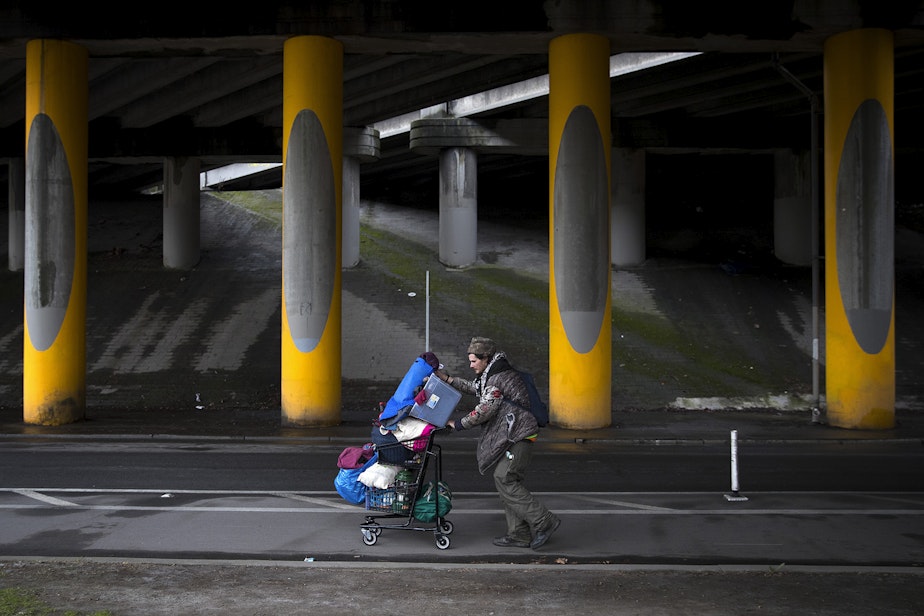King County and Seattle plan to pool homeless funding under regional authority

King County and Seattle officials say they’re ready to take the plunge on an ambitious plan to merge funding and coordination of homelessness services.
It’s something auditors have called for to make the system less fragmented. But there’s a long way to go.
King County Executive Dow Constantine and Seattle Mayor Jenny Durkan said Wednesday they’ve introduced legislation to create the King County Regional Homelessness Authority.
It doesn’t involve any new funding, but it would direct much of their current spending to a new governing board.
The county would contribute $55 million and Seattle would give the lion’s share, $73 million. About one-third of those totals is federal funding designated to provide homelessness services.
“One of the reasons Seattle has made such a financial commitment to this is because we believe there can only be a regional solution. We cannot go it alone,” Durkan said. “To see that succeed, we will tie our raft to everybody else’s raft.”
Sponsored
Until now, there have been nonbinding attempts to coordinate efforts between Seattle and the rest of King County, like the recent One Table initiative. But audits have called for a structure with the power to coordinate policy, contracts and performance across the county.
This legislation creates a new entity with a governing board that appoints its executive director and makes spending decisions. The governing board would be appointed by a steering committee that includes the county executive, a King County Council member, the Seattle mayor, a Seattle City Council member, a representative of a suburban city, and “two people with lived experience of homelessness.”
Sponsored
Durkan said this steering committee will take an up-or-down vote on each proposed budget.
“This is both to provide accountability but also a little bit of insulation, so that the people responsible for the work can actually do the work,” Durkan said.
The authority will assume oversight of homeless shelters in Seattle and King County, but not of Seattle's Navigation Team that coordinates outreach to and removal of unauthorized encampments.
Will Lemke, a spokesman for the Navigation Team, said there’s no indication the team is going away. It’s staying with the city and will continue to operate moving forward.
Lemke said the regional authority will align services across the board, but the Navigation Team is a Seattle-specific approach so it’s remaining under the jurisdiction of the city.
Sponsored
Carolyn Malone, 76, said she’s the type of person who could be a candidate for the steering committee. She only recently exited five years of homelessness.
“I know what it’s like,” she said. “I know strategies and different approaches to make homelessness extinct in this county.”
Colleen Echohawk, executive director of the Chief Seattle Club, said “unified doesn’t mean uniform,” and that service providers will continue to serve homeless populations in culturally specific ways, like a project the Chief Seattle Club is developing with modular housing in Seattle’s Sodo neighborhood.
Although Seattle and King County are leading the initial effort, several officials from suburban cities attended the announcement. Constantine said the initiative includes “on-ramps” for other cities to join when they’re ready.
Suburban cities will have one representative on the steering committee to start; a second representative will come on board once 20 cities join in.
Sponsored
Auburn Mayor Nancy Backus said cities like hers have received an important concession: They will keep decision-making authority for their jurisdictions.
“Although there is not agreement on every issue," Backus said, “the proposed legislation incorporates important feedback from the cities and makes great strides in addressing several key concerns about governance and funding.”
King County Councilmember Jeanne Kohl-Welles is leading the effort to pass the legislation in the council.
Councilmember Reagan Dunn said he will oppose the legislation and introduce his own proposal. Dunn said his constituents don’t like the way Seattle is addressing homelessness, and said the city would have too much sway in appointing the authority's governing board. Dunn represents District 9, which includes the southeast part of the county, including Maple Valley and Enumclaw.
“If we institute, for example, more of Seattle’s failed homeless policies and the problem continues to rise, then how do we change up the government structure? We won’t be able to get these folks out of office,” he said.
Sponsored
Dunn said his counter-proposal would include a town hall meeting of local officials to wrestle with the issue, and a program called Homeward Bound that is available in San Francisco and funds transportation for homeless people to go live with family members or friends outside the area.
“I think even the most liberal Democrat is starting to believe that maybe there is a bit of a 'tough love' solution that needs to be employed as part of our network of strategies to try and address the homeless problem," he said.
King County and Seattle officials say they hope the County Council and City Council approve the legislation for the new authority this fall. That would start the process of hiring a new executive director to get the new entity up and running in 2020.




